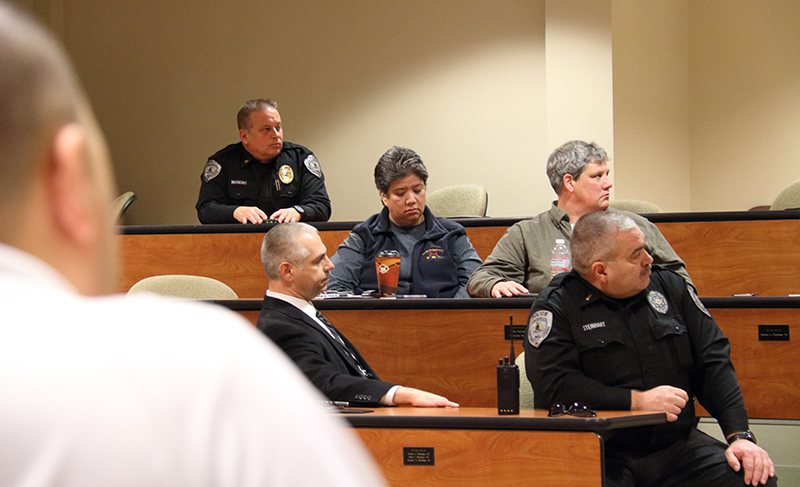Last week, emergency medical technicians (EMTs), police officers and members of Elizabethtown College’s Campus Security and Emergency Management Group (EMG) gathered to discuss a difficult but vital subject—the idea of and response to an active shooter on campus.
First, the group watched “The Coming Storm,” a fictionalized video account of the aftermath of an active shooter. Afterward, they discussed the ideas within. “It’s 27 minutes of what happens after a shooting,” said Andrew Powell, of the grim subject matter. Powell is director of Campus Security at the College and the organizer of the gathering.
The idea of the film, provided to the College by its campus liaison, Powell said, was to show how the FBI can help in a shooter situation, what resources they can offer and how to get a conversation started.
In addition to asking on-campus responders, Powell reached out to emergency personnel in the Elizabethtown area to see if they were interested in viewing the film, as well. About a half dozen Elizabethtown Borough police and Northwest Regional Police took interest, as did the Northwest EMS.
“We are fortunate to have a community of first responders who are solid partners with us in this,” said Liz Braungard, executive director of marketing in the College’s Office of Marketing and Communications and also a member of the EMG. “I think the response to this video discussion is proof of that.”
To better hone response plans, the EMG, which meets monthly, addresses issues that have occurred on campus and on other campuses, Braungard said. “The best way to improve reaction to a challenging set of circumstances is to practice, practice, practice.”
After the film screening, the group continued the conversation. “Leaders from the Elizabethtown Borough Police and the Northwest Regional Police shared some of the resources available at the local and state level and discussed some of the training the departments go through to prepare for an active shooter event,” said Powell. Also discussed was the development of the Tactical Emergency Medical Response concept, which, he said, involves police-escorted EMTs entering a scene, which still has the potential to be dangerous, in order to render aid to the critically injured.
Suzette Kreider, clinical operations manager for Northwest EMS, attended the film screening and discussion because “EMS must change how we have been operating in order to save as many lives as possible,” she said. The ideas brought forth in the film, she pointed out, are brand new to EMS, so the session offered the opportunity to bring her management team to begin exposing them to what needs to be done. “It is a big change for us but necessary.”
Kreider also feels strongly that EMS, law enforcement and Campus Security need to practice these situations together so, in the event of a real incident, they will work well together.
Kreider’s daughter is a student at Elizabethtown College, so her interest runs even deeper. “I want to ensure that if an incident occurred on campus, she, her friends and fellow students would all be in good hands.”


